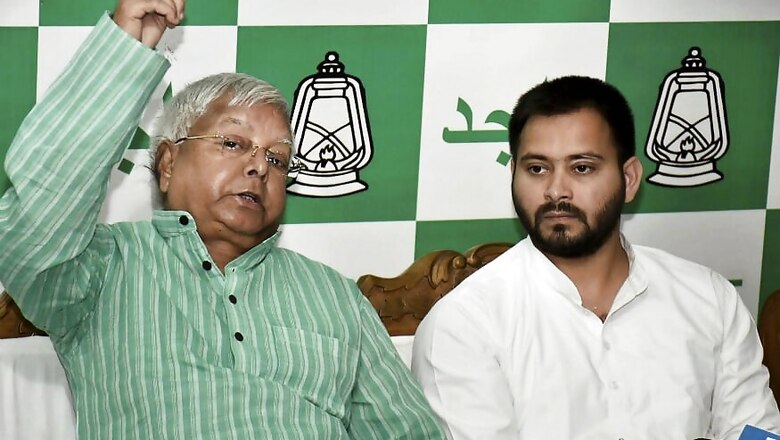
views
An apology means a lot to the Indian mind. We all have evolved with a social psyche which is formed within the ambit of Indian tradition. It taught us that excuses and apology are important Indian values. If someone asks or begs for it, it dilutes annoyance and complaints, and softens those who are angry for one reason or another.
Tejashwi Yadav, who runs the Rashtriya Janata Dal, in a big political move apologised for the mistakes that took place during the 15-year rule in Bihar of his father Lalu Prasad and mother Rabri Devi. Tejashwi offered the apology to the people of Bihar in a meeting of party cadres in Patna recently. His gesture became more valuable politically since his statement appeared just before the assembly elections to be held this year.
Tejashwi's statement is strategically divided in two parts: first, it contains an apology for the mistakes of his parents and, second, he proposed himself as a leader who believes in change and is committed to fulfill the aspirations of the people of Bihar. If we read this act of Tejashwi Yadav politically, it appears that first of all he tried to soften the upper castes of Bihar society who remember the Lalu-Rabri rule as a dark age. In fact, Tejashwi has learned from his political experiences that to acquire an impressive victory in Bihar, he needs to expand the social base of his party which is still stuck in the politics of castes and communities such as the Yadavs, a section of Muslims and the Dalit community. The upper castes, who are mostly with the BJP and supporting the Nitish Kumar-led NDA government in Bihar, are opinion-makers.
Wooing this section of Bihar's populace means a lot politically for the RJD in the current situation. Tejashwi seems eager to win over at least a section of this group and fracture the BJP vote base. The RJD leader has in the past few weeks facilitated the joining of many upper-caste influential leaders in his party even at the cost of objections by some seniors like Raghuvansh Prasad Singh who was very important during Lalu Prasad's reign.
So, Tejashwi's 'apology politics’ is another step in the direction of making a dent in the upper-caste social base of Bihar. Secondly, his act may also please the urban middle class which contains the OBCs and a section of the Dalit community with the upper castes.
This middle-class mind that aspires for a comfortable life also had many complaints against Lalu-Rabri's ways of running the state. To counter the narrative of the NDA in Bihar which is based on the slogan "15 versus 15"(meaning 15 years of Lalu-Rabri compared to 15 years of Nitish), Tejashwi may have taken this strategic position. The one thing that may go in favour of the RJD is that a new generation has emerged in Bihar that has not lived under the Lalu-Rabri regime. The youngsters may be also impressed by Tejashwi's statement and a trust may evolve in his leadership.
The second part of his statement which shows his commitment to bring a sea change to Bihar and work hard to fulfill the aspirations of the people may be read as an address to the Bihar public, beyond caste and communities to build up trust capital for his own politics. As we know, a new aspirant class, which is beyond caste-and-community politics, supports Nitish's governance since long and prepares opinion in his favour. Tejashwi Yadav is trying to change this equation in his favour. That is why, on the one hand he tries to pull out himself and his party from the old Lalu-Rabri governance image and is making an effort to craft a new image and narrative for his own politics which may attract all with the ideas of hope, equality, dignity and development.
It is interesting to observe that even in the process of building his new image, he is politically trying to reproduce the old positive image of Lalu-Rabri-led RJD as a new political resource. He wants to keep the social base of Dalits and OBCs who remember Lalu’s contribution in disseminating social justice in Bihar, and weave them into the various communities who are opposed to each other at this time.
It is true that an apology appeals to the Indian mind, but we will have to see how it is going to dilute the anger of upper castes and others who project themselves as victims of the Lalu-Rabri regime which has a dominant image of underdevelopment, violence and corruption. This image has been circulating from generation to generation in Bihar's society as an oral tradition.
(The author is professor and director of GB Pant Social Science Institute, Prayagraj. Views are personal.)



















Comments
0 comment